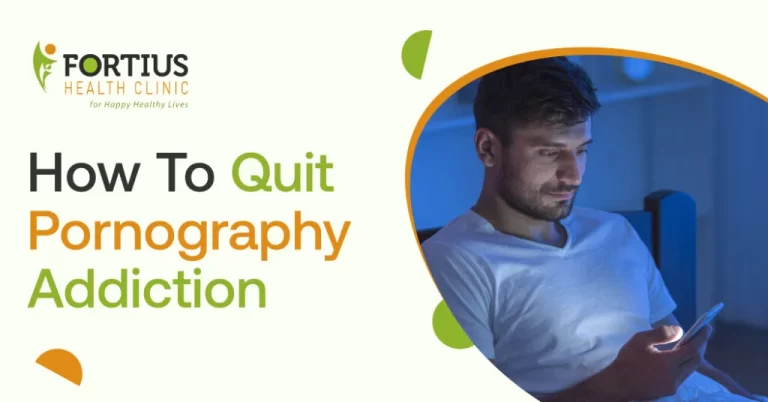
How To Quit Porn – An Complete Guide
In today’s digital era according to Gitnux market statistics approximately 30% of content shared on the internet is porn. This shows us pornography addiction is a serious issue affecting individuals around the globe. Easy access to explicit porn content has made it more challenging for individuals to combat this addiction. Overcoming this addiction requires awareness, commitment, and the implementation of effective strategies to break free from its grip. Let’s delve deeper into how porn addiction can impact various aspects of one’s life and the ways to get out of porn addiction.
what is porn addiction
Porn addiction is a compulsive behavior characterized by an individual’s inability to control their consumption of pornographic material despite negative consequences they face due to porn addiction in their life. It can lead to a range of psychological, social, and physical problems. Individuals with porn addiction often find themselves spending excessive amounts of time viewing pornography, experiencing intense cravings for more explicit content, and neglecting important responsibilities due to their preoccupation with porn.
This addiction can impact relationships, work or school performance, and mental well-being. Over time, individuals may develop a tolerance to the material, requiring more extreme or taboo content to achieve the same level of arousal. Seeking help from mental health professionals and support groups is essential in addressing porn addiction and reclaiming control over one’s behavior.
Causes of Pornography Addiction
Curiosity and Accessibility
One common cause of pornography addiction is easy access to explicit material online. The internet provides a vast array of explicit content that is readily available at the click of a button, making it easy for individuals to indulge in such material out of curiosity.
Psychological Factors
Psychological factors such as stress, anxiety, depression, or low self-esteem can contribute to the development of a pornography addiction. Some individuals may turn to pornography as a coping mechanism to escape from negative emotions or life challenges.
Social Influences
Social influences, including peer pressure or cultural norms that normalize pornography consumption, can also play a significant role in the development of addiction. Exposure to explicit material through friends, media, or even partners can contribute to the normalization and escalation of porn use.
Neurological Impacts
Studies have shown that excessive porn consumption can lead to changes in the brain’s reward system similar to those seen in substance addictions. The constant release of dopamine associated with viewing explicit content can create a cycle of craving and dependence on more extreme forms of pornography for gratification.
Past Trauma
In some cases, past trauma such as childhood abuse or neglect can predispose individuals to seek comfort or distraction in pornography. Using explicit material as a way to numb emotional pain or fill voids left by past experiences can result in addictive behaviors over time.
How Porn Addiction Affects Your Life
Relationship Strain
One of the primary impacts of porn addiction is the strain it puts on relationships. Excessive consumption of pornography can lead to unrealistic expectations about sex and intimacy, causing rifts between partners. It may also result in secrecy, betrayal, and lack of emotional connection.
Psychological Effects
Porn addiction can have detrimental effects on one’s mental health. Individuals may experience feelings of guilt, shame, and anxiety due to their inability to control their behavior. This addiction can also lead to a distorted view of sex and desensitization towards real-life intimacy.
Physical Consequences
Extended periods of watching porn excessively can have physical consequences as well. It may lead to issues like erectile dysfunction, fatigue, and reduced libido. The constant dopamine release from viewing explicit content can rewire the brain’s reward system, leading to dependency.
Impact on Productivity and Lifestyle
Porn addiction can significantly impact an individual’s productivity and lifestyle choices. Spending excessive time consuming pornography may result in neglecting responsibilities, loss of interest in hobbies or activities, and disrupting daily routines.
6 Ways To Quit Porn Addiction
Recognizing the Problem
The first step in overcoming pornography addiction is acknowledging that there is a problem. Many individuals may feel ashamed or embarrassed about their addiction, but it is essential to understand that seeking help is a sign of strength, not weakness.
Seeking Professional Help
Seeking professional help is an effective way to overcome your pornography addiction. Therapists and counselors specializing in porn addiction can provide guidance, support, and tailored treatment plans to address the root causes of the addiction.
Setting Boundaries
Setting boundaries is crucial when dealing with pornography addiction. This can include restricting access to pornographic content by using website blockers or filters, setting limits on screen time, and creating a supportive environment that promotes healthier behaviors.
Engaging in Healthy Activities
Replacing the habit of watching pornography with healthy activities can be beneficial in overcoming addiction. Engage in activities such as exercise, hobbies, socializing with friends and family, meditation, or pursuing personal interests to redirect focus away from harmful behaviors.
Building a Support System
Having a strong support system is essential for successfully overcoming pornography addiction. Surround yourself with understanding and non-judgmental individuals who can offer encouragement, accountability, and companionship during challenging times.
Practicing Self-Compassion
Cultivating self-compassion and forgiveness is vital on the road to recovery from pornography addiction. Understand that setbacks may occur along the way but treating oneself with kindness and understanding can help maintain motivation and resilience against future challenges.
Other Treatment options to overcome porn addiction
cognitive-behavioral therapy (CBT)
CBT helps individuals identify and change their patterns of thinking and behavior towards porn. Support groups, whether in-person or online, can also provide a sense of community and shared experiences for those struggling with porn addiction.
Medications
Some individuals may benefit from medications that help manage underlying issues such as anxiety or depression that can contribute to addictive behaviors. For severe cases, residential treatment programs offer a structured environment away from triggers where individuals can focus on recovery.
Meditation and yoga
Mindfulness practices like meditation and yoga have shown promise in helping individuals increase self-awareness and self-control over their impulses. Additionally, lifestyle changes such as increasing physical activity, improving sleep quality, and fostering healthier relationships can also play a significant role in overcoming porn addiction.
Benefits of Quitting Porn
Quitting pornography can have significant benefits that includes
- Improved Mental Clarity – Reducing or eliminating porn consumption can lead to better focus, concentration, and mental sharpness.
- Enhanced Emotional Well-being – Quitting porn often reduces feelings of guilt, shame, and anxiety, leading to improved emotional health.
- Stronger Relationships – Without the influence of unrealistic portrayals of intimacy, you can build deeper, more authentic emotional connections with your partner.
- Increased Self-confidence – Overcoming a reliance on porn can boost self-esteem and body image, helping you feel more empowered in real life.
- Better Sexual Performance – Many individuals experience enhanced sexual performance and satisfaction by quitting porn, as sensitivity to real-life stimuli improves.
- Reduced Risk of Addiction – Quitting reduces the chances of developing or worsening an addiction, which can have negative consequences on both mental and physical health.
- Healthier Brain Function – Continuous porn use can impact the brain’s reward system. Quitting helps restore natural dopamine levels, leading to better impulse control.
- Improved Productivity – With less time spent on watching porn, you can dedicate more time to personal goals and productive activities.
- Increased Empathy and Respect – Moving away from porn encourages healthier views of relationships and respect for others, improving overall social interactions.
Takeaway
Overcoming pornography addiction is a challenging journey that requires dedication, perseverance, and a willingness to seek help when needed. Contact Fortius Health Clinic for counseling and support tailored to your needs. Your brighter future starts with a simple action today.
FAQs
To stop watching pornography forever it's important to develop healthy coping mechanisms, seek professional help if needed, and build a strong support network. Avoid triggers, limit internet access, and find productive hobbies to occupy your time. With determination and the right resources, it is possible to break the cycle of pornography addiction and live a fulfilling life.
To overcome pornography addiction, establish healthy boundaries, find alternative activities to replace the habit, seek counseling or support groups, practice mindfulness, and address underlying issues driving the addiction. It's a challenging but worthwhile journey towards regaining control and developing a fulfilling, addiction-free lifestyle.






